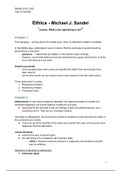IBA/BA 2019- 2020
Vrije Universiteit
Ethics - Michael J. Sandel
‘Justice, What’s the right thing to do?‘
Chapter 1
Price-gouging → pricing above the market price, when no alternative retailer is available.
In the Middle Ages, philosophers were of opinion that the exchange of goods should be
governed by a ’just price’
- just price → determined by tradition or the intrinsic value of things.
- However, economists believe prices are determined by supply and demand, so there
is no such thing as a just price.
Sowell (economist)
- ‘price gouging arises when prices are significantly higher than what people have
been used to’.
- but the price levels you are used to are no more special or fair than other prices.’
Three approaches to justice
1. Respecting Freedom
2. Maximizing Welfare
3. Promoting Virtue
Chapter 2
Utilitarianism = main idea as stated by Bentham ‘the highest principle of morality is to
maximize happiness, the overall balance of pleasure over pain.’
● reasoning for this principle is that our feelings of pain and pleasure govern us in
everything we do. They are our sovereign masters.
According to utilitarianism, the government should do whatever would maximize the utility of
the community as a whole.
● ‘if we sum up all the benefits of this policy and subtract the costs, will it provide more
happiness than the alternative.’
Jeremy Bentham
● criticized the idea of natural rights
● the right thing to do is whatever will maximize utility.
○ utility = whatever produces pleasure or happiness and whatever prevents
pain or suffering.
Objections to Bentham’s utilitarianism
1. Individual rights
1
,IBA/BA 2019- 2020
Vrije Universiteit
a. the most glaring weakness of utilitarianism is that it fails to respects individual
rights, by caring only about the sum of satisfactions.
b. for the utilitarian, the individual matters, but only in the sense that it each
person's preferences are counted along with everyone else’s.
c. this means that there is a risk of treating people in the way that violate
fundamental norms and decency of respect.
Is torture ever justified?
Case: A terrorist gets tortured in order to find out where the bomb has been hidden.
Some utilitarians oppose torture on practical grounds and principle.
● practice ground → torture won’t work, because information extracted under duress is
often unreliable. Thus, the society is not made any better.
● principle → people believe that it violates human rights and fails to respect the
intrinsic dignity of human beings. Their case against torture does not depend on
utilitarian considerations. They argue that human rights and human dignity have a
moral basis that lies beyond utility.
2. Common currency of value
a. utilitarianism weighs preferences without judging them. Everyone’s
preferences count equally.
b. In order to aggregate preferences, it is necessary to measure them on a
single scale. But according to the objection, all values cannot be captured by
a common currency of value.
John Stuart Mill
Mill believed that the objections to Bentham’s utilitarianism can be answered. Mill tried to
save utilitarianism by recasting it as a more humane, less calculating doctrine.
Objection answered: Individual rights
Central principle of Mill → People should be free to do whatever they want, provided they do
not harm to others.
● government should not interfere with the individual liberty in order to protect a person
from himself, or the impose the majority’s beliefs on how to live best.
● ‘As long as I am not harming someone else, my independence is, of right, absolute.
● Mill thinks we should maximize utility, not case by case, but in the long run. And
over time, he argues, respecting individual liberty will lead to the greatest human
happiness.’
Why would upholding individual liberty and right to dissent promote the welfare of society in
the long run?
1. a dissenting view may provide a corrective on earlier beliefs.
2. dissenting views will prevent existing views to turn into dogma and prejudice
2
,IBA/BA 2019- 2020
Vrije Universiteit
3. it deprives the society from energy and vitality that prompt social improvement.
Mill believes, ‘forcing a person to live according to custom or convention or prevailing opinion
is wrong, because it prevents him from achieving the highest end of human life- the full and
free development of his human facilities. Conformity, in Mill’s account, is the enemy of the
best way to live’.
Objection answered: Common currency of value
Mill believes that utilitarians are able to distinguish between higher pleasures and lower
pleasures.
Bentham believes
● pleasure is pleasure, pain is pain
● the only basis for judging one experience better than the other one is the intensity
and the duration of the pleasure or pain it produces.
● he recognizes no qualitative aspect of pleasures.
● Takes people’s preferences as they are, without judging them.
● who is to say, which pleasures are higher lower? No one.
Mill believes
● it is possible to distinguish between higher and lower pleasures.
● we should assess the quality, not just the quantity or intensity of our desires.
● happiness = presence of pleasure and absence of pain
● how do we know which pleasure is higher?
○ of two pleasures if there is one which all or almost all who have experience of
both give a decided preference, irrespective of any feeling of moral obligation
to prefer it, that is the most desirable pleasure.
● the higher pleasures are not higher because we prefer them; we prefer them
because we recognize them as higher.
Chapter 3 - Do we own ourselves? Libertarianism
Opinions on economic inequality
● (-) inequality is unjust, some people therefore favor taxing the rich to help the poor.
● (+) there is nothing wrong with inequality, as long as it is not acquired through fraud.
Case: Wealth distribution, Take from Bill Gates and Give to the Poor.
● If we take from Bill Gates and distribute his 1 million among the poor people; the
utility if the poor people will increase more compared to the pain Gates would suffer
from losing a small amount of 1 million.
The above Robin Hood scenario has two objections:
1. [from utilitarian perspective] high tax rate will reduce the incentive to work. If Bill
Gates will lose the incentive to earn a lot, there will be less to distribute over the poor
because the economic pie shrank.
2. [argument from outside] taxing the rich is unjust because it violates a fundamental
right. According to this objection, taking money from Bill Gates without consent, even
3
, IBA/BA 2019- 2020
Vrije Universiteit
for a good cause, is coercive. It violates their liberty to do with their money
whatever they please.
Libertarians favor unfettered 1markets and oppose government regulation, not in the name
of economic efficiency, but in the name of human freedom.
Central claim: ‘each of us has a fundamental right to liberty- the right to do whatever
we want with the things we own, provided we respect other people’s right to do the
same.’
The minimal state
Only a minimal state is compatible with the libertarian theory of rights?
● A state that only forces contracts, protects private property from theft and keeps the
peace, no other intervention.
The libertarian rejects three types of policies and laws that modern states commonly enact:
1. No paternalism
a. oppose laws that prevent people from harming themselves.
example: car seat belt laws and motorcycle helmet laws.
such laws violate the right of individuals to decide what risks to assume. As
long as no third parties are harmed and the individual is responsible for its
own medical bills, the state has no right to decide what risks they are allowed
to take with their bodies and lives.
2. No moral legislation
a. oppose using the coercive force of law to promote notions of virtue or to
express the moral convictions of the majority.
example:homosexuality.
just because is not accepted by a majority in a certain region, it does not
mean that the law should ban homosexuality.
3. No redistribution of Income or Wealth
a. rules out any law that requires to help others, including taxation for
redistribution of wealth. Such help should be up to the individual to undertake
and not mandated by the government.
Milton Friedman
● objects the minimum wage laws
○ government has no right to prevent employers from paying any wage
● if employers want to discriminate on the basis of race, religion, or any other factor,
the state has no right to prevent them from doing so.
1
unfettered = not restricted
4





